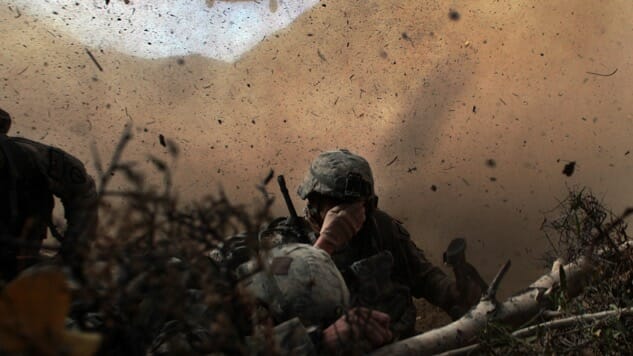On July 3, 1979, President Jimmy Carter signed the first directive that would make up Operation Cyclone—providing funding and training, with the assistance of the Pakistani government, to the Afghan Mujahideen. Carter’s National Security Advisor Zbigniew Brzezinski advised the president that arming and training the Mujahideen would likely facilitate Soviet intervention in the country—something that Brzezinski favored. For Brzezinski and the hawks within the Carter administration, the Soviet invasion of Afghanistan was “the opportunity of giving to the USSR its Vietnam war.”
The USSR is gone now yet America remains involved in Afghanistan. Since the communist government fell, the Afghan government has changed hands three times. And from the vantage point of the 2001 invasion—not only has the US occupied the country for a period longer than our own Vietnam—with 1965 marking the introduction of ground troops to that country—but the US war in the country has lasted longer than the Soviet war in Afghanistan. If or when the US decides to withdraw completely from Afghanistan, it’s not unreasonable to assume some future National Security Advisor will talk, like Brzezinski, of giving a rival “its Afghan war.”
Not only has it become accepted that the war in Afghanistan may last another decade or more, the war is no longer noteworthy. It merited little attention on the campaign trail in 2016—asked about zero times during the presidential debates and mentioned only once as it related to the function of NATO. This stands in contrast to the 2012 election, where Obama campaigned in part on Mitt Romney’s inability to develop a plan to end the war.
No longer do politicians and commentators even give pretext that the war in Afghanistan is serving a demonstrable goal in the still ongoing war on terror. By conservative estimates, the government controls only a little over half of the country and have slowly been losing ground since late 2015. If continued US presence in the country is meant to stop a resurgent Taliban, they have failed.
Additionally US-sponsored infrastructure projects continue to be plagued by fraud and bribery, and infrastructure projects built nearly a decade ago have fallen into severe disrepair. Nearly 16 full years of military occupation has produced little to show. The American war in Afghanistan has been decisively lost.
There is no longer a coherent long-term plan for Afghanistan. In the absence of any other concrete goal, the war in Afghanistan has paradoxically become about maintaining America’s position in Afghanistan. The Taliban will continue to be fought off in districts where it can and, barring the complete collapse of the current Afghan government, the foreign policy establishment can live with an open-ended war—particularly one that makes few headlines and for whom most of the causalities are Afghan and not American.
U.S. Forces Afghanistan (USFOR-A) reported that approximately 57.2% of the country’s 407 districts are under Afghan government control or influence as of November 15, 2016, a 6.2% decrease from the 63.4% reported last quarter in late August, and a nearly 15% decrease since November 2015.
—Special Inspector General for Afghanistan Reconstruction Report, January 30th 2017
One of the reasons there has been no serious reevaluation of the war in Afghanistan is that exceptionalism, along with America’s infallible use of military force, goes unquestioned assumptions in Washington. Admitting defeat in Afghanistan means admitting that despite the billions of dollars spent and the lives lost, it ultimately amounted to nothing. Far from being “the indispensable nation,” the US is just as capable of failure as the superpowers that came and went before it. It also raises larger existential questions—if America had to admit defeat in Afghanistan as the Soviets before them, does this mean too that the American empire could face the same fate?
Insistence of American exceptionalism in the face of defeat has long been a bipartisan project. It was Hubert Humphrey that condemned “syndromes of self-condemnation over our past mistakes and self-pity over what we perceive as a lack of appreciation,” in the wake of Vietnam—a position that wasn’t all that far off from the bellicosity in Reagan’s talk of a “Vietnam syndrome.” So too has modern defeat engendered insistence from across the aisle that the military defeat was not rooted in underlying assumptions of American foreign policy. President Obama’s characterization of Afghanistan as “the good war” in 2008 to his echoing neocon Robert Kagan in 2012 when he said, “America is back” flew in the face of conservative critics who complained that Obama believed America wasn’t exceptional.
For the Trump administration, amid calls for another troop surge, there is unlikely to be a significant shift in policy on Afghanistan. The notion that the problems of the existing Afghan government require solutions that cannot be addressed by the US military or COIN operations is basically a non-starter for those in Washington. No one with the power to enact a withdrawal from Afghanistan would even consider it a legitimate option.
It’s an indictment on the US military presence that it’s neither decimated the Taliban’s presence in the country nor made the government in Kabul more stable. That indictment extends not only to the short-term tactics currently embraced by the military but the long-term assumptions underlying the American approach to the war. There is no conventional military solution or victory in Afghanistan.
It was this failure of imagination and a belief in American exceptionalism that set the US up for long-term failure in Afghanistan at the cost of billions of dollars and thousands of human lives. John Kerry, then only a veteran of the Vietnam war, once asked those in Washington how they could ask a man to be the last to die for a mistake. It is a question that we should ask once again as there appears to be no end to the war in Afghanistan in sight—not only as it pertains to American troops in Afghanistan but the Afghan people themselves.
